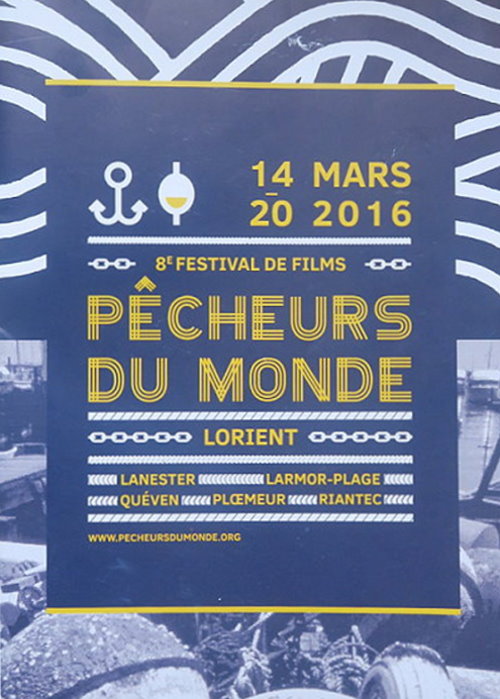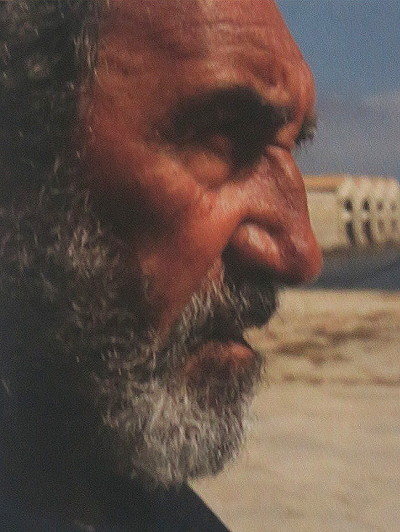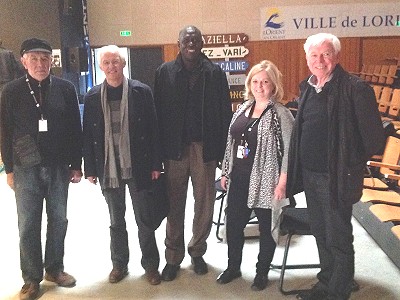Viewpoints of people of the sea and film makers
 Jacques Chérel, Secretary of the film festival „Pêcheurs du Monde“ (Fishermen of the World) introduces this year’s festival in Lorient, Brittany, France, from 14 to 20 March 2016. For this 8th edition, the power of the images casts light on the people of the sea, forgotten by the grand conferences. Fishermen of the Seychelles (Fishermen of Paradise), from Quebec (Les pêches maritimes du Québec), from Chile (Salmonopoly), from Brittany (Océan électro), workers of the Bronx (BX46), Indian saltworkers (My Name is Salt), women fish vendors in Dakar (Guinaw Rails), women divers in Timor-Leste (Wawata Topu: les sirènes du Timor-Leste), shellfish gleaners (Les semeurs de palourdes) … speak about their lives, their fears, their hopes. True „sentries“ of the state of the ocean, they are affected by pollution (Oil and Water), the effects of climate change (The Sea of Change), the drama of migration (Persisting Dreams, Simshar) or of precariousness (La perche du Nil). They resist globalisation (Le thon, la brute et le truand) and privatisation of the seas putting their survival in jeopardy (Penghulu). In „Mourir pour des images“, René Vautier shows the extent to which a film director needs to be committed particularly towards „the small people“.
Jacques Chérel, Secretary of the film festival „Pêcheurs du Monde“ (Fishermen of the World) introduces this year’s festival in Lorient, Brittany, France, from 14 to 20 March 2016. For this 8th edition, the power of the images casts light on the people of the sea, forgotten by the grand conferences. Fishermen of the Seychelles (Fishermen of Paradise), from Quebec (Les pêches maritimes du Québec), from Chile (Salmonopoly), from Brittany (Océan électro), workers of the Bronx (BX46), Indian saltworkers (My Name is Salt), women fish vendors in Dakar (Guinaw Rails), women divers in Timor-Leste (Wawata Topu: les sirènes du Timor-Leste), shellfish gleaners (Les semeurs de palourdes) … speak about their lives, their fears, their hopes. True „sentries“ of the state of the ocean, they are affected by pollution (Oil and Water), the effects of climate change (The Sea of Change), the drama of migration (Persisting Dreams, Simshar) or of precariousness (La perche du Nil). They resist globalisation (Le thon, la brute et le truand) and privatisation of the seas putting their survival in jeopardy (Penghulu). In „Mourir pour des images“, René Vautier shows the extent to which a film director needs to be committed particularly towards „the small people“.
Shooting a picture with them to bring them into existence requires „to be with them“, to „feel with them“, to share their viewpoints (Le Chant d’une île). This unique festival promotes these films in Brittany and is part of its territorial identity. During seven days, some 50 films are screened in six municipalities in Lorient county. Some are novel films, some translated, first films, two movie premieres „Les Océans, la voix des invisibles“ by Mathilde Jounot, „Le Biche“ by Gilbert Thoraval. Each time, more organisations partner with the festival, this time again also the Food and Agriculture Organization of the UN (FAO). The screenings are accompanied by meetings, dreams, creations by citizens cameras, a whole adventure. Mundus maris thanks Alain Le Sann, President of the Festival, for the kind invitation and hospitality extended to Mundus maris Vice-President Aliou Sall from Senegal. Aliou has been following developments in the world of small-scale fisheries all his professional life and was keen to catch up with the festival and its multi-facetted story lines. It was definitely worth it!

Shot of the film – Le Thon, la Brute et le Truand – by Vincent Maillard
With the large number of films and powerpoint presentation in different venues, it was impossible to watch all screenings. But thanks to the advice of the organisers he made sure to view at least a few „must see“ films. One was certainly the première of „La voix des invisibles“ by Mathilde Jounot: 52 min. of search by the film maker to come to grips with the different perspectives of alarming news about the decline of resources in the ocean and the efforts to protect marine biodiversity through a massive drive to establish new marine protected areas (MPAs). Stumbling over contradictory research results and ambiguous statements of big non-governmental organisations promoting biodiversity and the environment, the film invites critical reflection about their true motives. Borne out of a challenging conversation with a fisherman in Bretagne during the previous festival, one can not escape the suspicion that some environmental claims may be serving more to privatising large swathes of the sea to the highest bidder than a true concern for much needed biodiversity protection. What about the fishers themselves, especially artisanal operators? This thought-provoking film illustrates how difficult it can be to do a robust assessment out of the claims and counterclaims. One conclusion can, in any event, be drawn: unless all stakeholders, including artisanal fishers with their often detailed local knowledge are part of the governance process, the attempts at environmental protection can easily backfire and threaten local people’s livelihoods. Mathilde Jounot film certainly invites to develop management processes with sufficient checks and balances, particularly with a place-based and inclusive approach to managing the environment, which puts limits to the power of multinational interests, financial or otherwise. At the end of the ensuing debate the audience was unanimous in suggesting to give the film a large international distribution to take this important debate into every corner of the globe where there are artisanal fisherfolk. It was also recognised that there are some constraints, e.g. in some more remote locations short of electricity organising such a viewing would pose a particular challenge. Another film that triggered vivid exchanges was „Salmonopoly“ by Wilfried Huisman and Arno Schuman (2010). It depicts the environmental and human cost of intensive salmon culture in southern Chile at the hands of Norvegian salmon tycoon John Fredriksen. His company, Marine Harvest, is the biggest salmon producer in the world. Contrary to Norway, Chile’s environmental legislation and labour protection are much weaker – with drastic consequences described by eye witnesses and victims.

The festival was the occasion for interesting debates and reconnecting with friends. Aliou Sall, middle, bracketed by Alain Le Sann and Amphi Cheval as well as Jean Peeters and Guy Danic
As the screening took place in the Lycée Dupuy de Dôme, in addition to the ordinary audience, teachers brought their pupils. The debate among the approximately 100 visitors, half of them young people, focused on what could be done to prevent such abuse in the future. Many questions addressed the unsustainability of culturing carnivores (like salmon) and the overcapacity in capture fisheries, all of which require structural reforms in the sectors. The FAO representative voiced the concern of her organisation on how to make such reforms happen. She suggested FAO could help member states strengthen their legislation. She also believed that food habits of consumers could be one of the angles to help change bad practices. The Slow Food movement could be seen as a concrete response that warranted wider adoption. Pierre Mollo, an experienced teacher from Lorient, underlined the importance of introducing or strengthening environmental and sustainability issues in the ordinary curriculum in order to raise greater awareness already in the youngsters and to impart the necessary values for critical and responsible behaviour. That resonated well with the efforts of Mundus maris during pilot activities for FAO and its Nansen Project to develop teaching aids about the ecosystem approach to fisheries for schools in West Africa. Pierre Mollo was therefore pleased to receive a sample for further use. The professional jury selected winners in several categories. These films will be projected again in Lanester on World Oceans Day, 8 June. The special mention of the jury for young cineasts was reserved for „Papé“ by Nicolas Polixene for his poetical film about an old fisherman attached to his cultural traditions. Discover this and much more about the festival and the winners at the festival website.
